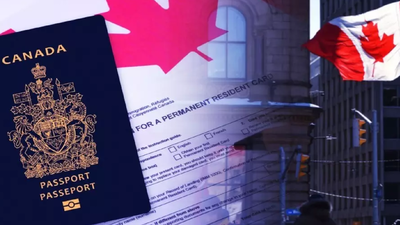ARTICLE AD BOX

Canada, long seen as one of the most welcoming destinations for international education, is closing its gates faster than ever before. New data from Immigration, Refugees and Citizenship Canada (IRCC) show that a record 62% of student visa applications were rejected in 2025, a sharp rise from 52% last year and well above the 40% average of previous years, according to Pie News. For many students worldwide, the numbers signal not just paperwork hurdles, but a fundamental shift in Canada’s approach to international education.
A decade-high rejection rate
IRCC data reveal that rejection rates are at their highest level in ten years. Indian applicants appear to be the most affected, with reports suggesting that as many as 80% of their applications have been denied. While a full country-wise breakdown has not been disclosed, the scale of denials points to ripple effects for students from across Asia, Africa, and beyond, Pie News reported.For families who view Canada as a pathway to opportunity, this abrupt tightening is a jolt. The nation hosted more than one million international students in 2024, second only to the United States, with 41% of them from India, 12% from China, and more than 17,000 from Vietnam, VnExpress noted. The latest numbers are poised to reshape that balance.
Why Canada is shutting the door
Immigration experts link the rejections to mounting domestic pressures. Housing shortages, infrastructure stress, and concerns about whether students can financially support themselves have all pushed Ottawa to act. Jonathan Sherman, vice president of BorderPass, a Canada study permit support platform, told Pie News that “IRCC is clearly scrutinizing study permit applications much more strictly.”
Alongside tighter scrutiny, Ottawa has raised the bar: The minimum financial proof has doubled to CA$20,635 (US$14,963). Students must also provide clear study plans and error-free documentation, consultancy ApplyBoard said to Pie News. These measures, officials argue, are intended to ensure only well-prepared candidates enter the system.
Fewer permits, stricter rules
The government has announced plans to issue 437,000 study permits in 2025, nearly 10% fewer than last year. Of these, 73,000 are earmarked for postgraduate students, around 243,000 for undergraduates and other programs, and roughly 120,000 for school-age children and renewals, according to VnExpress.Rules for post-graduation work permits have also tightened. University graduates must now present English or French language test results at B2 level or above, while college graduates need at least B1. Any student shifting to unapproved programs will no longer be eligible for a post-study work permit, Pie News reported. To add to the changes, Ottawa has also shut down the Student Direct Stream, a scheme that once enabled faster visas without financial proof for students from 14 countries.
The bigger picture for students
For the more than one million students who chose Canada in 2024, the clampdown raises urgent questions about the future. The promise of global education, once closely tied to Canada’s open-door policy, is being recalibrated against the nation’s own social and economic constraints.The consequences extend beyond individual applicants. Universities and colleges, many of which rely heavily on international tuition fees, face uncertainty.
Source countries, from India and China to Vietnam, must also reckon with the fact that opportunities abroad are narrowing.
Who pays the price?
In the end, it is students who carry the heaviest burden. They spend months preparing documents, proving finances, and shaping study plans, only to see ambitions cut short by policy shifts outside their control. For families, the denials represent not just financial loss but the deferral of a dream.Canada still remains a top study destination, but the lesson is clear: Global education is no longer guaranteed, even in countries once seen as the safest bet. For students, schools, and policymakers alike, the sharp rise in rejections is a reminder that opportunities abroad are inseparably tied to the challenges at home.



.png)
.png)
.png)
















 2 hours ago
4
2 hours ago
4








 English (US) ·
English (US) ·